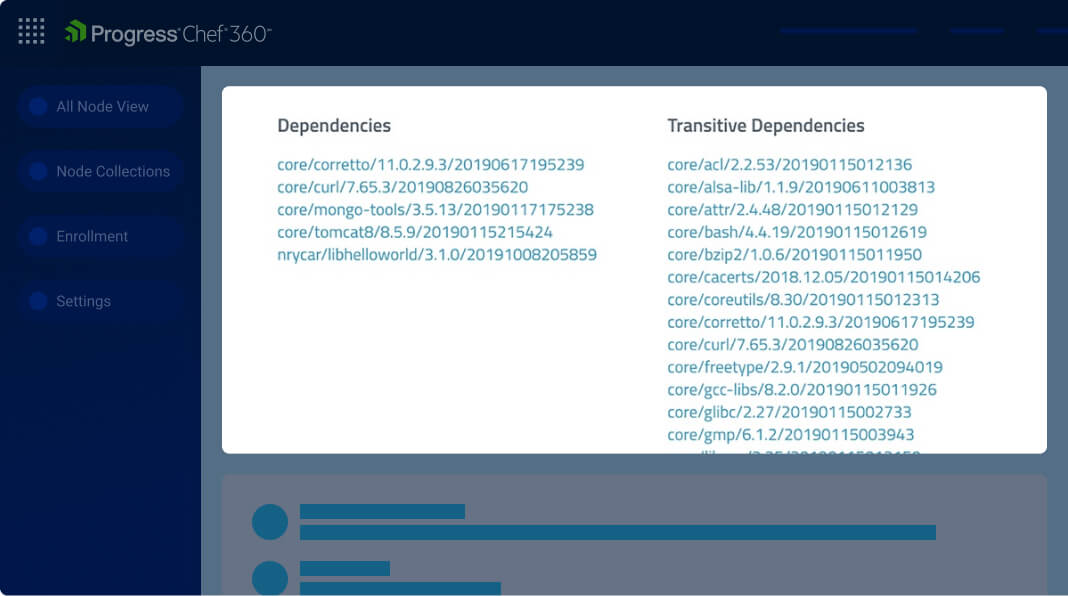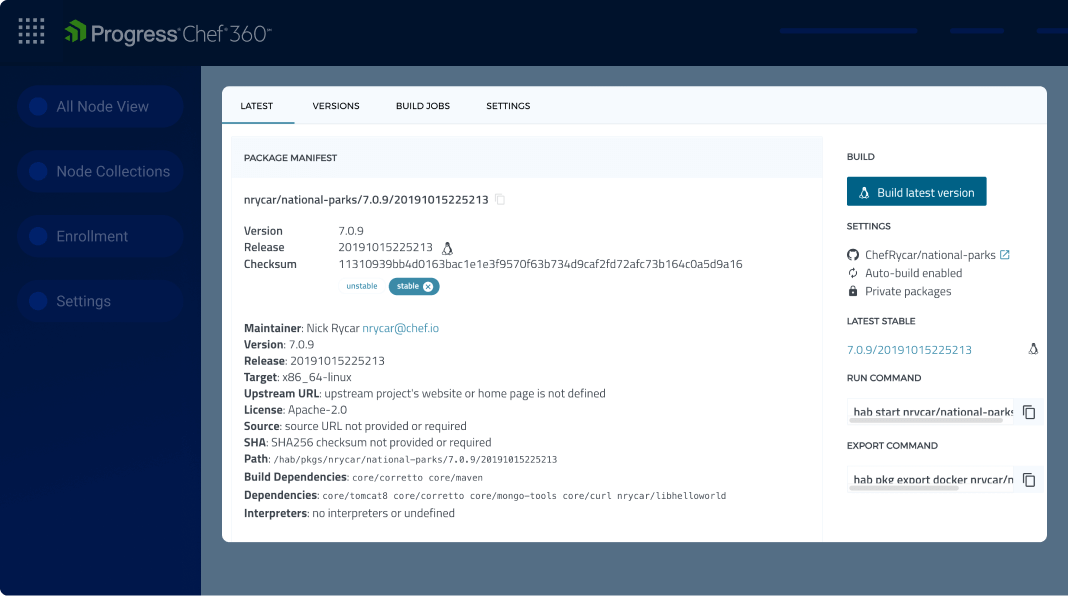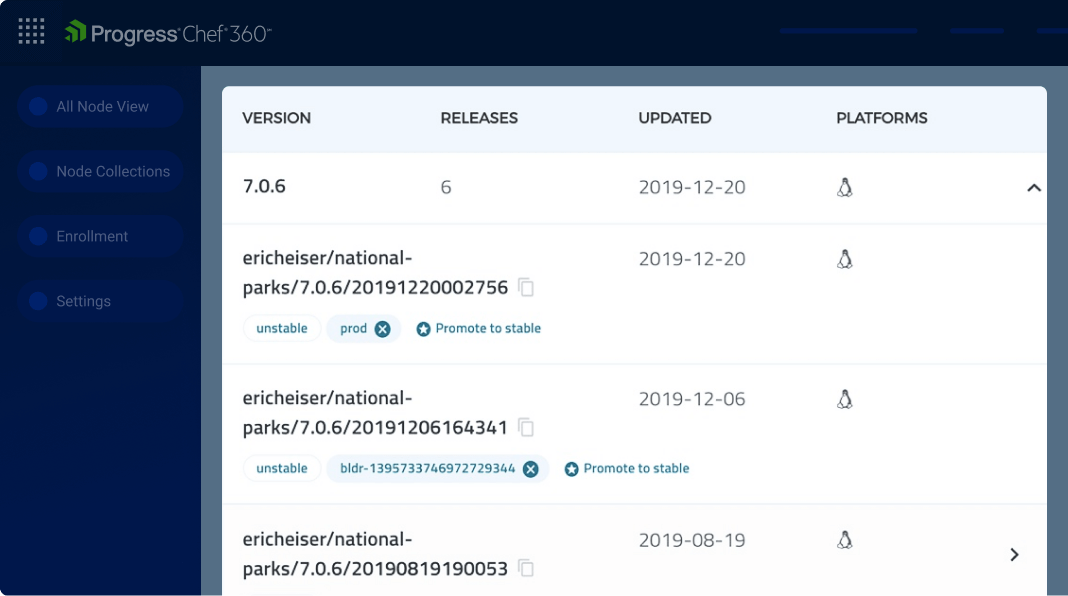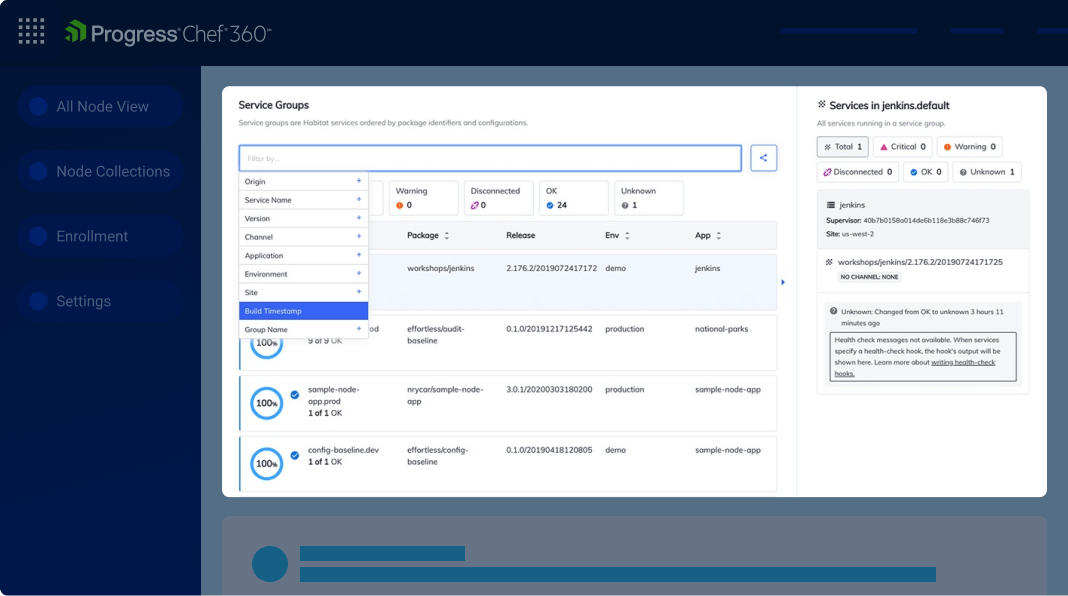
Application Delivery
Application Delivery Automation
Deliver successful application outcomes consistently at scale with Chef.
Chef Habitat in 60 seconds


Using Progress Chef , You Can:
Define and Package Applications and Infrastructure
Use a modular, technology-agnostic approach to streamline delivery across diverse environments.
Deploy Across Any Landscape
Deliver applications and infrastructure across on-premises, hybrid and cloud environments.
Manage Complex Environments
Simplify CI/CD with a unified UI for artifact review, channel promotion, deployment patterns and automated rollbacks.
Track Updates
Gain real-time visibility into application health and status across environments with dashboards for quick remediation.
Core Features
Unified Application Delivery:
Standardize, Secure and Streamline
Define Applications
Define and codify application dependencies early to catch issues at build-time, not run-time.

Standardize Packaging
Create immutable, signed artifacts with a universal specification to maintain secure, consistent application delivery.

Streamline Delivery
Simplify CI/CD with a unified interface for artifact management, channel promotion, automated rollbacks and real-time operational insights.

Unified View
Track application status across environments with dashboards that enable quick verification, failure detection, and automated remediation.

Latest from Chef
One App Delivery Solution.
Multiple Beneficiaries.
Chef App Delivery enables IT teams to break down communication silos and improve how they work together to build, deploy and manage applications.
Developer Productivity
Developers get to use the technologies they are most comfortable with, while giving them on-demand access to DevTest environments and the ability to promote releases themselves.
Operational Consistency
Operations get codified, tested, ready-to-go and compliant artifacts that are consistently defined and built alongside the app and can be easily integrated with other DevOps tools.
Quality and Efficiency
QA teams no longer have to wait for environments to start testing. They can receive updates when changes are made to supporting systems and see which apps are impacted.
Release Velocity
Release teams no longer must understand each aspect of the app. They can manage deployments across environments at scale and see results in real time.
Benefits of Using Chef for App Delivery
Increase Productivity
Save thousands of hours configuring, updating dependencies, versioning, testing and remediating apps across Dev, QA and Ops.
Reduce Operational Overhead
Standardize the way apps are delivered and reduce the number of tools, scripts, plug-ins that need to be maintained.
Remove Defects Earlier and Deploy Faster
Shift defect resolution from run-time to build-time and deploy to production up to 90% faster.
Empower App Teams with Application Delivery with the Chef Platform
The Chef platform enables supporting teams to:
- Breakdown communication silos with the adoption of agile delivery practices that scale across development, operations and security.
- Streamline complex workflows caused by the adoption of cloud-native architectures that add to the rising sea of dependencies while supporting existing systems.
- Leverage existing investments in existing Chef software configuration assets and other DevOps tools while accelerating the adoption of modern application architectures and delivery methods.

Explore App Delivery Capabilities of Chef
Chef Support, Built Around You
Chef support isn’t just about solving tickets - it’s about helping you grow, learn and shape what comes next. Whether you're just getting started or scaling enterprise-wide, here are three ways we’re standing by to support your journey:
LearnChef
Explore hands-on, self-paced learning built by Chef engineers. LearnChef helps your teams master the platform quickly - so support extends beyond tickets, into real, sustainable skill-building.
Maturity Assessment by Chef
Uncover where your DevSecOps strategy stands - and where it can go. Chef Services benchmarks your maturity, identifies gaps and delivers a clear roadmap to scale securely.
Customer Validation Program (CVP)
Be the first to shape what’s coming. Our Customer Validation Portal lets you test new features early, offer feedback, and partner directly with the product team of Chef.
Recommended Content

Start Your Journey Today
Try App Delivery with Chef to see how we support your environment, workflows and scale requirements.




